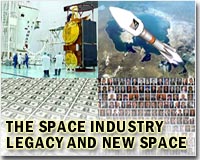 |
Paris, France (ESA) Sep 25, 2009 For the fifth time, ESA hosted this month the one-week CEMS kick-off seminar for students from leading European management schools to learn about technology transfer and what it takes to turn space technology breakthroughs into viable non-space businesses. Organised by ESA's Technology Transfer Programme Office in cooperation with ESA Human Spaceflight's Erasmus Centre as well as the Rotterdam School of Management Erasmus University (RSM), the Community of European Management Schools (CEMS) seminar gives students the chance to work with space technology and to discover its exploitation potential. CEMS is a strategic alliance of leading European business schools and multinational companies and its first mission is to set a global standard of excellence for university master students in business management. The students were divided into competing teams, each given a space technology patent, this year offered by Dutch Space, that they had to commercialise for non-space applications through a spin-off venture set up for that purpose. They had to prepare a feasible business plan and present the results at the end of the week to a jury. During the week, the students were given lectures on entrepreneurship, technology transfer and new venture creation, and they were supported by the RSM faculty, ESA staff and experts from industry, including business developers from Dutch Space. Participating student Elmy Sarruco said, "it was a lot of hard work, but we had a great team. Although we met here for the first time, we quickly noticed we complemented each other well for this collaborative project. We had several good ideas, and we were eager to make a successful business case. I'm happy we succeeded, even in view of the enormous time pressure." Niels Eldering, Technology Transfer Officer at ESA and member of the jury, commented, "space business is very international, as well as entrepreneurial. The European space community requires business and technical professionals to work together on a daily basis, especially when it concerns exploitation of space based technologies in new markets. These CEMS students proved to be capable of doing just that. They really came up with bright, unexpected ideas." The technology from Dutch Space was to analyse bacteria in space and the winning team defined a profitable niche market in the food process industry. Their business plan would result in a positive cash flow in just five years.
ESA's Technology Transfer Programme Office (TTPO) Share This Article With Planet Earth
Related Links ESA's Technology Transfer Programme Office (TTPO) The latest information about the Commercial Satellite Industry
 Boeing firms up Canadian presence
Boeing firms up Canadian presenceOttawa (UPI) Sep 21, 2009 Boeing is consolidating its presence in Canada with two major aircraft deals that guarantee long-term in-service support operations in the country alongside assembly and manufacturing activities. In August, Boeing Integration Defense Systems won a contract to supply 15 CH-47F Chinook helicopters, designated in Canada as the CH-147, and earlier the company delivered four Boeing C-17 ... read more |
|
| The content herein, unless otherwise known to be public domain, are Copyright 1995-2009 - SpaceDaily. AFP and UPI Wire Stories are copyright Agence France-Presse and United Press International. ESA Portal Reports are copyright European Space Agency. All NASA sourced material is public domain. Additional copyrights may apply in whole or part to other bona fide parties. Advertising does not imply endorsement,agreement or approval of any opinions, statements or information provided by SpaceDaily on any Web page published or hosted by SpaceDaily. Privacy Statement |